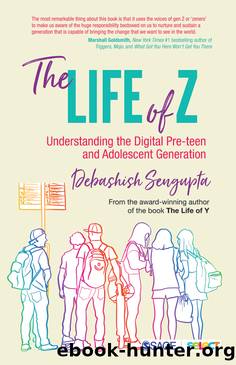The Life of Z by Sengupta Debashish;

Author:Sengupta, Debashish; [Sengupta, Debashish]
Language: eng
Format: epub
Publisher: SAGE Publications India Pvt, Ltd.
Published: 2019-12-26T00:00:00+00:00
Impact on Cognitive Development
Researchers in the USA, Canada and France have found a clear link among excess âscreen timeâ, early exposure to mobile and gadgets and poor cognitive skills among kids. The strong link between time spent staring at the screen and brain function potentially reflects the interruption of the stress recovery cycle needed for growth in children. Each minute of time spent on screen takes away a minute from sleep. Too little sleep and excess screen time are clearly linked to a drop off in cognitive skills, such as language ability, memory and task completion, besides raising concern about rise in attention deficit hyperactivity disorder among kids.
The problem of excess screen time because of overuse of mobile, digital technology and TV is universal. A study by Jeremy Walsh, a researcher at the Childrenâs Hospital of Eastern Ontario Research Institute, found that only 1 in 20 kids in the USA meets guidelines on sleep, exercise and screen time. On an average, children aged eightâeleven years spend 3.6 hours per day glued to a TV, mobile phone, tablet or computer screen, against the recommended 2 hours. Thatâs almost double the recommended limit.
ABCD is a landmark study on brain development and child health supported by the National Institutes of Health (NIH), USA. This project has recruited nearly 10,000 kids to follow them into early adulthood and understand the impact of environmental, social, genetic and other biological factors on brain and cognitive development and that can enhance or disrupt a young personâs life trajectory. In brain scans of 4,500 children, daily screen usage of more than seven hours showed premature thinning of the brain cortex, the outermost layer, which processes information from the physical world. The difference is significant from children who spend less time on screen. According to lead researcher Dr Gaya Dowling, it may be too soon to draw linkages between thinning of brain cortex and cognitive development of kids; however, early results from the ABCD study show that children who spent more than two hours of daily screen time scored lower on thinking and language tests.
Paediatricians from France and the USA urge parents not to allow children any screen time until the age of eighteen months. Canada is the first country to propose time limits on backlit screen.
Dr Girish H. C. and Dr Anil M. U., both prominent consultant paediatricians in Bengaluru, feel that the overexposure to mobile/gadgets and consequently to the digital world has somewhere diminished personal connect and replaced the same by a digital connect. The kids and adolescents of this generation are more connected to the virtual world than to the real world. The influence that this virtual world is having on them is disturbing and even at times dangerous. Too much use of mobile/gadgets from a very young age creates its own sets of problems.
Speech Delay
Speech delay is becoming a big issue among young kids with the advent of the mobile and digital world. It is not uncommon to find a two-year-old getting worried about the presence of Wi-Fi wherever they go, even to a hospital.
Download
This site does not store any files on its server. We only index and link to content provided by other sites. Please contact the content providers to delete copyright contents if any and email us, we'll remove relevant links or contents immediately.
Chaco's Northern Prodigies : Salmon, Aztec, and the Ascendancy of the Middle San Juan Region after AD 1100 by Paul F. Reed(379)
Digital International Relations by Unknown(376)
Law Enforcement Interpersonal Communication and Conflict Management by Brian Douglas Fitch(366)
Skilled interpersonal communication: Research, theory and practice, Fifth edition by Owen Hargie(355)
The Enduring Color Line in U.S. Athletics by Krystal Beamon Chris M. Messer(353)
Critical Perspectives on Human Security : Rethinking Emancipation and Power in International Relations by David Chandler; Nik Hynek(342)
EPSO CAST Political affairs EU policies: How to succeed in the selection procedure by Franco Reverte José María(329)
Evidence-Based Policy Making in Labor Economics by Hamermesh Daniel S.;Nottmeyer Olga K.;Nottmeyer Olga;King Sarah;King Sarah;King Sarah;(319)
Writing Public Policy - A Practical Guide to Communicating in the Policy Making Process by Catherine F. Smith(299)
Criminological Theory in Context by John Martyn Chamberlain(295)
Rothschild and Early Jewish Colonization in Palestine (Geographical Perspectives on the Human Past) by Ran Aaronsohn(292)
Positive Psychology and Spirituality in Counselling and Psychotherapy (Conflict, Ethics, and Spirituality, 12) by unknow(289)
Tibeton Yoga Its Secret Doc by Evans-Wentz(283)
Social Problems, Social Issues, Social Science by James Wright(280)
Threshold Concepts in Women's and Gender Studies by Christie Launius Holly Hassel(279)
Cognitive Development in Infancy and Childhood (Elements in Child Development) by Mary Gauvain(273)
Play in child development and psychotherapy: toward empirically supported practice by Sandra W. Russ(272)
Latin American Politics and Society by Gerardo L. Munck & Juan Pablo Luna(253)
The Arab Spring Abroad: Diaspora Activism against Authoritarian Regimes by Dana M. Moss(234)
